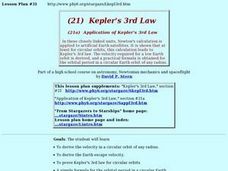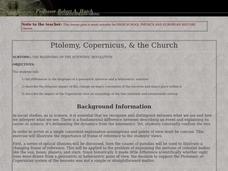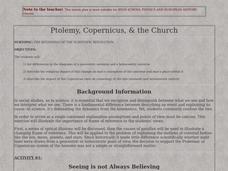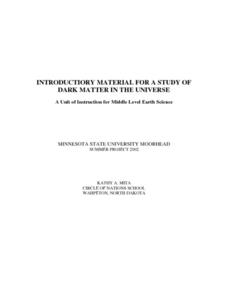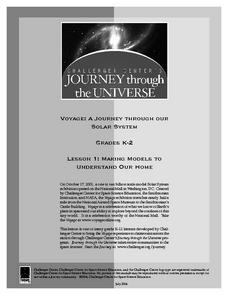Curated OER
Journey To The Solar System
Third graders engage in a lesson to find different facts and connect them to the concept of the solar system. They conduct research using the technology integration of the internet. Using the information the students create a classroom...
Curated OER
Asteroids
Students examine the different types of asteroids and how they enter the atmosphere. In this space lesson students use mashed potatoes to create an asteroid they can eat.
Curated OER
Meteors
Learners identify the different types of meteorite using an interactive website. In this earth science lesson, students simulate how meteors crash on a surface. They relate meteor size to crater size.
Curated OER
Kepler's 3rd Law
Learners derive the velocity in a circular orbit of any radius. They derive the Earth escape velocity and prove Kepler's 3rd law for circular orbits # A simple formula for the orbital period in a circular Earth orbit of given radius.
Curated OER
Ptolemy, Copernicus, & the Church
High schoolers determine the difference between a geocentric universe and a heliocentric universe.
Curated OER
Ptolemy, Copernicus, & the Church
Students explore the scientific revolution. In this scientific revolution lesson, students complete activities regarding Ptolemy, Copernicus, and the Church.
Curated OER
Dark Matter In The Universe
Students investigate the concept of dark matter and how it occurs in the universe. They conduct research using a variety of resources. Students use the information by reading at least two articles about dark matter. They also generate...
Curated OER
Interplanetary Distance and Travel Time
Students are introduced to the challenges involved in understanding the space travel distances and the time involved to do so through the use of an interactive fable. The modeling and comparisons deal with specific distances at different...
Curated OER
Making Models To Understand Our Home
Learners investigate the concept of a model and how it is used to represent something that is real. They recognize how the model can be applied to other types of concepts like the solar system. Students create a scale drawing of a house...
Curated OER
Sky Watching
Students complete night-sky observations to understand how our knowledge of the sky has been enhanced by telescopes. Students complete a timeline worksheet giving the history of telescopes. Students then then make their own observations...
Curated OER
Spuds in Space
Students explore the effects of velocity on an object when it collides with another object. They design and outfit a potato astronaut in a spacesuit to withstand the hazards of high velocity impacts from space debris and meteoroids.
Curated OER
Satellites and the Radiation Budget
Students engage in a prelab discussion about the earth's radiation budget and global warming. They use "trading cards" to find specific websites to research radiation budget questions.
Curated OER
Making Numbers Manageable
Eighth graders recognize and express numbers when written in time saving techniques. They gather data from a variety of sources, including print and electronic media. They develop a presentation using a variety of techniques.
Curated OER
Location
Students explore the tools used by Columbus to chart his latitude. They study the change of a location over time.
Curated OER
Lesson 4 Activity 1: Mapping the Third Dimension
Students work in pairs to construct a simple stereoscope.
Curated OER
Air Quality Issues
Students identify the different layers of the atmosphere. They examine the different types of air pollutants. They also discover laws in effect that work to protect the environment.
Curated OER
Lunar Myths
Fourth graders explore the phases of the moon. In this moon lesson, 4th graders research myths regarding the moon and create a PowerPoint presentation to share their findings.
Curated OER
HABITAT for the other 90%
Learners examine the connection between the habitat needs of endemic species to the habitat needs of humans. In this habitat lesson learners research the habitat requirements of a given family then develop an idea to improve the habitat...
Virginia Department of Education
Hurricanes: An Environmental Concern
Hurricanes, typhoons, and tropical cyclones are the same type of storm, but their names change based on where they happen. Scholars use a computer simulation to learn about hurricanes. Then they hypothesize ideas to prevent hurricanes...
Curated OER
Solar Matters II
Students research solar energy. In this solar energy lesson, students construct a KWL chart and research solar energy through various websites and related readings. Students complete a science journal page as an assessment.
Curated OER
Gravity Gets You Down
Students investigate the force of gravity and how it effects different objects that are put into acceleration when applied the experiment of free falling. They drop different objects that have a variety of masses and some that cause air...
Curated OER
Sunny Delight
First graders explore completing experiments through the scientific method.
Curated OER
Microbial Influence on Earth's Systems
Learners identify the different biogeochemical cycles on Earth. In this biology activity, students observe microbes under a microscope. They compare and contrast respiration and photosynthesis.
Other popular searches
- Sun and Planets Wordsearch
- Sun and Planets Word Search
- The Sun and Its Planets
- Sun and Planets Pictures
- Planets Distance From Sun
- Why Do Planets Orbit the Sun





